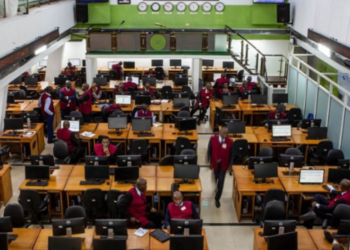The Nigerian equities market has in recent weeks recorded impressive gains, as investors take positions in blue-chip stocks.
The All-Share Index and market capitalization, on Wednesday, gained 0.50%, to settle at 25,783.02 points and N13.474 trillion respectively, reducing the YTD loss to -3.92%.
As the COVID-19 virus continues to rattle global financial markets, including the Nigerian bourse, it became prevalent to seek diverse opinions about Nigerian equities. In this case, that of Nigerians living abroad.
READ: Leaked memo: CBN instructs banks to block bank account of 38 companies for “forex abuse”
Nairametrics interviewed Investment Experts, Traders and an Engineer, seeking their opinions on what Nigerian Stocks they will presently consider for a BUY.
Their responses were varied, ranging from top Banking, Industrial, and unsurprisingly, Agriculture-based stocks.
London based, Lukman Otunuga, the Senior Research Analyst at ForexTime (FXTM) said,
READ: CBN allows banks to pay winnings, salaries for 7 banned betting & gaming companies
“In a world where the coronavirus menace has created widespread chaos, disruptions, and uncertainty, no prisoners were taken.
“Oil has been one of the biggest causalities of COVID-19, down roughly 40% year-to-date (YTD), as worldwide restrictions a few months back, crippled demand for the commodity. With a fair chunk of Oil & Gas companies losing billions of dollars to the pandemic, their respective stock prices declined considerably.
“Big names in Nigeria such as Oando, LekOil, Seplat Petroleum Development Company, and 11 Plc, among others, have seen their shares depreciate between 20 to 40% + YTD. However, if Oil rebounds on stabilizing global economic conditions and a possible breakthrough in finding a COVID-19 vaccine, this could provide an opportunity for Oil & Gas companies to roar back to life – ultimately pushing stocks higher.”
READ: Trading on Nigerian equities has dropped by 44%
According to France-based Computer Engineer, and COO, Feldel Gas Limited, Oladayo Oladele,
“Generally speaking, I will be interested in stocks in the IT/Telecoms sector, which includes MTN Nigeria, Airtel, because Nigeria has a digital economy that is growing at an exponential rate. Lots of tech startups like PiggyVest, Paystack, and Flutterwave are fast becoming internationally relevant, not forgetting agriculture-based stocks like Okomu oil, as the border closure by President Buhari’s administration seems to increase their profitability in the near term. Finally, FMCG stocks, like Nestle and Unilever, as significant buying pressures from their offshore-based parent companies, shows a high room for more upside.
“My bias is that, no matter how unstable Nigeria’s economy looks presently, these domains are the least affected in my opinion.”
READ: Can Agriculture replace Oil in Nigeria?
In the words of Scotland-based Market Analyst, and an Energy Trader, Dapo-Thomas Opeoluwa, “When it comes to picking stocks from overseas, it’s a bit difficult, because we do not know how the companies are faring in the country. Sometimes we go with Warren Buffet’s recommendation of investing in a good business.
“So, to be on the safe side, we invest in the household names that give us dividends, and hopefully capital appreciation in the long run.
“I invest in Zenith; GTB; Stanbic; Sahco PLC (which are particularly promising, because of its cheap price and high potential, given how tourism might pick up, the aviation company might benefit); and Dangote Plc.
READ: Nigeria’s stock market drops by N16.88 billion
“Sometimes we go through the financials of these companies, and check if the businesses are healthy and if they’ve got what we call ‘moat’.
“Notably, because our stock exchange isn’t as fundamentally driven, as it is in England or the United States, we can’t trade stocks like we do overseas.”
Explore the Nairametrics Research Website for Economic and Financial Data
It is imperative to note that, most of the professionals interviewed seem unsurprisingly attracted to banking, energy dominated stocks, and most especially, blue-chip stocks on their prevalence to Nigeria’s economy.
Many Nigerian stocks still look greatly undervalued, and exhibit high potential for more upsides, in terms of their present price action and also attraction attributes to foreign portfolio investors in the long term.


















